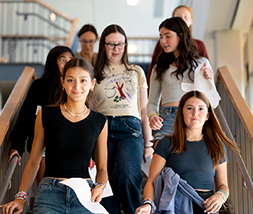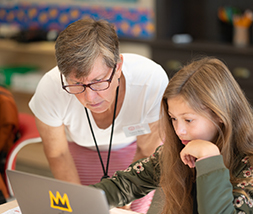Words in Space
Last year at graduation, I advised the soon-to-be alums to make themselves a happy playlist, one that they could turn to on a bad day or when they needed a little joy. I wanted to be one among many voices that reiterated the importance of celebrating the good, even when times are tough.
Lately, I have been thinking about what I find delightful, and I am glad to report that there are many things! Above all, there is no bad day that can’t be cured by spending time with the students. But also: Peet’s coffee, watching our athletes play, Brahms’ Symphony No. 4, a sunrise row on the Charles, the New York Times puzzle Connections, an evening view of the Milky Way, time with colleagues working together to solve a problem or build a new program, a hike through the snowy woods with my family. And a good story, whether fictional or not, one that lifts my sights and helps me feel that I am somehow seeing into the heart of things.
And so it was that the story of the Europa Clipper appeared to me last week like a watering hole in the desert—a restorative gift in the midst of these apprehensive times. On October 14, NASA launched the spacecraft Europa Clipper, whose mission is to travel 1.8 billion miles to Jupiter’s second moon, watery Europa, and see whether it might be able to support life. The trip will take over five years, and it is merely exploratory. But what caught my attention was NASA’s request of poet laureate Ada Limón, over two years ago, that she write a poem to accompany the Clipper on its journey.
After she had completed the poem, she went to visit the jet propulsion lab where scientists were working on the rocket. As the New York Times reports, “Limón met with Bob Pappalardo, the Clipper mission’s project scientist, who was on hand to decode the various components of the probe. ‘She wanted to talk about the spacecraft; I wanted to talk about poetry,’ Pappalardo said. ‘We got to talking about how poetry touches our lives. When the project manager was describing the spacecraft, the conversation turned toward how every part was special. It was made by people. It was made by human hands.’”
This realization prompted the engineers to ask Limón to write out the poem in her own hands, so that they could etch it onto one of the panels of the spacecraft, and send her actual handwriting on the long journey to Europa. A very personal gift launched into the void, carrying a message on our behalf.
At our best, this is what we humans do: strive to know and understand even when it will take years, bring our own personal experiences to our work with others, and revel in the joy of our shared knowledge and shared humanity. We delight in beauty, we grieve our losses, we hope for better times, we commit wholeheartedly to one another.
Over the next five years, we may forget about Europa Clipper, but it will still be headed to Europa, looking outward on our behalf, bringing a voice into the darkness that speaks of our hopes and dreams, a voice that is impossibly optimistic about connecting this world with others.
In Praise of Mystery: A Poem for Europa
Arching under the night sky inky
with black expansiveness, we point
to the planets we know, we
pin quick wishes on stars. From earth,
we read the sky as if it is an unerring book
of the universe, expert and evident.
Still, there are mysteries below our sky:
the whale song, the songbird singing
its call in the bough of a wind-shaken tree.
We are creatures of constant awe,
curious at beauty, at leaf and blossom,
at grief and pleasure, sun and shadow.
And it is not darkness that unites us,
not the cold distance of space, but
the offering of water, each drop of rain,
each rivulet, each pulse, each vein.
O second moon, we, too, are made
of water, of vast and beckoning seas.
We, too, are made of wonders, of great
and ordinary loves, of small invisible worlds,
of a need to call out through the dark.





